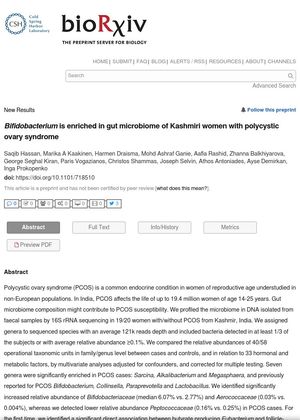Bifidobacterium Is Enriched in Gut Microbiome of Kashmiri Women with Polycystic Ovary Syndrome
July 2019
in “
bioRxiv (Cold Spring Harbor Laboratory)
”
polycystic ovary syndrome PCOS gut microbiome Bifidobacterium Sarcina Alkalibacterium Megasphaera Collinsella Paraprevotella Lactobacillus Bifidobacteriaceae Aerococcaceae Peptococcaceae Eubacterium follicle-stimulating hormone FSH butyrate fasting blood glucose hip circumference waist circumference gut bacteria blood sugar hip size waist size

TLDR Kashmiri women with PCOS have more Bifidobacterium in their gut.
In 2019, a study was conducted on 19/20 women with/without polycystic ovary syndrome (PCOS) from Kashmir, India, to understand the role of gut microbiome in PCOS susceptibility. The researchers profiled the microbiome in DNA isolated from faecal samples and found seven genera significantly enriched in PCOS cases: Sarcina, Alkalibacterium, Megasphaera, Bifidobacterium, Collinsella, Paraprevotella, and Lactobacillus. Specifically, the relative abundance of Bifidobacteriaceae and Aerococcaceae was significantly increased, while Peptococcaceae was lower in PCOS cases. For the first time, a significant direct association was identified between butyrate producing Eubacterium and follicle-stimulating hormone levels. Increased relative abundance of Collinsella and Paraprevotella was observed with higher fasting blood glucose levels, and Paraprevotella and Alkalibacterium with larger hip and waist circumference, and weight. This study showed a relationship between gut microbiome composition and PCOS, linking it to specific reproductive health metabolic and hormonal predictors in Indian women.






